- Home
- Alex Archer
Sunken Pyramid Page 8
Sunken Pyramid Read online
Page 8
“You never fired this,” he told her. “Understand?”
She was outside before him and sliding fast down the embankment, heading toward the Explorer, sword appearing in her hand. Had she called Joan’s legendary blade? Or was it reflex? No matter. Racing into trouble, it had joined her. The pommel felt good against her skin, the blade hidden in all this rain; she didn’t worry that the detective would see it.
The Explorer was lying silent. There was no sound, no movement. It took only a second before Annja smelled the gasoline.
“The fuel line!” she hollered, not bothering to look behind her to see where the detective was. The busted fuel-injection system must be pumping gas onto the hot engine. Spirals of smoke rose in the rain. “Stay back, Manny! Stay back!” In spite of the downpour a fire began. “Stay back!”
She ran what she judged to be a safe distance away and dropped to a crouch, mud oozing up around her ankles. From her vantage spot she saw the Explorer explode, the driver’s side door flying up as if it had been shot out of a canon. Pieces of glass flew through the air, glittering red with blood. Chunks of metal also flew, propelled like deadly shrapnel as the fire fought against the storm to eat through what remained of the SUV.
Annja had expected screams from the men trapped inside the fireball, but the crash and explosion had happened so fast. She hoped they had perished before the flames got them, though at the same time she was furious that she couldn’t get a close look at them, that she couldn’t have saved them and demanded they tell her what this was about.
She dismissed the sword. Her fingers fluttered over the tall plants and grass. There was something oddly pleasant in the sensation. She watched the flames lick at the metal husk, the rain batter everything. In the back of her mind she pictured Joan of Arc burning in fire.
Steam rose from the car and spread out over the field like a blanket of early-morning fog. She listened to crackles and pops, hisses, the tat-a-tat of the storm, to the siren...two sirens, three, four...that grew louder still and then stopped. In fact, it hadn’t taken the sheriff’s deputies and state patrol long to get here. Everything had happened so quickly.
Two lives snuffed out in a handful of minutes. She stood, the mud grabbing at her feet. Detective Rizzo huffed up beside her. Out of breath, he leaned forward and put his big hands on his knees.
“Too old for this,” he said. “Forget what I said about the sheriff being able to find us now. Aliens from space could see this fire. Too damn old for all of this.”
“But at least we’re going to get older,” Annja told him. “You’re a great driver, Manny. I thought we were going to get plastered on the highway.”
He nodded toward the burning car. “It’s going to be some time before we find out who they were. Dental records, stolen plates, all of it black.” He turned and slogged back toward the highway, his breath coming out ragged.
Annja watched the fire for a few more minutes. The rain was slowly winning out. She looked over her shoulder and saw the detective struggle up the embankment, pulling himself by grabbing onto vines and weeds. She waited several minutes more while he talked to the sheriff’s deputies and state troopers. Another state police car pulled up; six cars total had lights bouncing around through the gloom. Then, satisfied that gaining any information right now from the Explorer and the charred bodies was useless, she returned to the highway.
Surprisingly, the Impala hadn’t suffered a lot of damage.
She scraped her feet against a piece of guardrail to pry off the mud.
“I suppose we’re headed back into Madison,” she said.
“Yeah,” Manny replied. “Medical examiner is on the way. This is a crime scene, and that means we’re actually not going anywhere until we’ve answered a whole lot of questions.”
Annja overheard a state trooper on a cell phone talking to the Madison Police Department. “One of your officers, a Detective Manolito Rizzo, has been involved in a lethal-force incident outside his jurisdiction.”
“Oh, hell,” Manny said. “We’re gonna be here forever. I hate paperwork.” He pointed to the thick scratches on the Impala and the crooked and dented rear bumper. “Gonna have paperwork for this, too. A big damn tree worth of paper for all of this.”
Annja’s stomach rumbled, but she knew no one could hear it over the radio chatter and rain.
Chapter 12
A reporter from the Wisconsin State Journal was the first to arrive. His photographer was in tow, a thirtysomething redhead Garin thought attractive enough to approach...were the circumstances a little different. The reporter was immediately shooed out of the ballroom, which had been divided by ceiling-high accordion panels into three lecture halls.
Garin was taking it all in and watching it unfold. The conference organizer had established the rules. He wouldn’t let any reporters into the seminars—unless they purchased a full conference membership, and then they were to observe a modicum of professionalism. But they were welcome to remain in the lobby, hallways, the restaurants and the sidewalk out front, interviewing whichever conference attendees were willing to give them the time of day. The organizer himself declined to comment.
The Journal reporter went to work, hitting up one after the next—anyone with a conference badge—and taking notes, indicating who he wanted the redhead to get shots of. Garin had not yet put his own badge back on, and therefore was apparently not a viable target.
As the minutes ticked by, he noticed an unusually large number of cars and vans pull up. Local television reporters from the look of them, making sure each hair was in place and that they got as little rain on them as possible.
The logo on the side of a VW Beetle that stopped out front was small, Althouse, and Garin almost missed it. He found out minutes later it was a local blogger, as was the woman from The Critical Badger who arrived soon after. Young, thickset and dressed in browns, he mused that she looked like her blog’s namesake.
Something must have hit the scanners about the deaths at the conference, or maybe an item had appeared on the police blotter that caught the media’s hungry eye. It didn’t matter what had drawn them— Garin considered the very presence of the media inconvenient...and wholly to be avoided on his part.
Garin noticed that most of the archaeologists looked put off by all the media attention, several of them grumbling that it was ruining the conference.
A television news reporter announced herself to a hawk-nosed woman, who had apparently emerged from one of the divided rooms to see what the commotion was.
“I am Katrina Jacoby here at the Great Lakes States Archaeological Conference in Madison, and I am speaking this afternoon with—” She put her recorder under the woman’s hawk nose.
“Dr. Olivia Rouse.”
Garin took the staircase up to the second floor, stepping past a fresh-faced, gangly-looking reporter trying to interview unsuspecting guests. The newsman looked young enough to be delivering papers rather than writing for them. Garin was both amused and irritated by all the activity, and hoped it would go away soon. Ahead of him, a prudish-looking woman in her late forties held a notebook. He couldn’t tell if she was a reporter or with the conference. She opened her mouth to say something to him, but he brushed by.
He went down the hall, found the room he was looking for, slipped inside and put on his badge. A few minutes late, he’d missed the start of the session. He selected a seat in the last row as far from the door as possible. There were two speakers: the program listed them as a husband-wife team from Milwaukee who had just returned from France, part of a dig team from a small site.
Joan of Arc had been burned within a few miles of their Rouen workplace. Garin pinched the bridge of his nose; another memory he tried to unsuccessfully push to the back of his mind.
“She remains a significant figure to all of Western civilization,” the woman lectured. “Th
e French, from politicians to clergy to writers, all invoke her name. Even our own Mark Twain—”
Garin studied the other attendees. He thought he might see Annja here, the topic hitting close to home. Perhaps she thought it all old hat and that this pair could teach her nothing that she hadn’t already learned on her own or from Roux or himself.
There were only two dozen men and women in the chairs, though the room could hold easily three times that many. According to the revised program, this lecture was up against seminars about Native Americans, Early Mississippi River Culture and Technological Tools for Today’s Archaeologists—perhaps topics more appealing to the bulk of the attendees.
Garin moved up a row, directly behind someone he vaguely recognized.
“Yes, our own Mark Twain wrote about Joan of Arc,” the woman continued. She hit a few keys on her laptop, and a scene from their small dig appeared on the screen. “We had the pleasure of working with French archaeologists just outside Rouen, where Saint Joan was burned at the stake for being a heretic.”
The rest of the speaker’s words did not hold Garin’s attention. He had known Joan personally, had served under Roux to protect her, and no matter how deep historians and archaeologists dug and researched, they would never be able to paint a true picture of the Maid of Orleans.
Garin leaned forward, tapped the man’s shoulder and whispered. “Are you Annja Creed’s cameraman?”
Rembert turned and whispered back. “I’m a cameraman. I wouldn’t call myself ‘hers.’ She’s not here. She’s down at the police station. You’ll have to—”
“I don’t want to talk to Miss Creed,” Garin returned. “I’d like to talk to you. I’ll buy you a drink. In the bar downstairs.” He looked at his watch. “Say, in two hours. Actually, let’s make it an early dinner, an hour from now.” There shouldn’t be much of a crowd in the restaurant then.
“I saw you talking to Annja earlier. You are—” Rembert’s voice rose a little too much and he drew a “Shhhh!” from a man nearby and a stern look from the speakers.
Garin turned his badge so Rembert could read: Gary Knight.
“I may have quite the story for you,” Garin whispered. He leaned closer still, so he could read Rembert’s badge. “I have something far more interesting than what the media circus is trying to ferret out, Mr. Hayes.”
“One hour,” Rembert said. “Sure.” A pause. “You’re buying, right? Dinner and drinks?”
Garin nodded and left as the picture on the screen changed to broken pots the dig team had discovered.
Chapter 13
“You’re buying, right?” Rembert took another glance at the menu. “I’ll take the grilled New York strip and a bottle of Guinness stout.”
“The glazed ahi tuna,” Garin decided. “And bring a bottle of your Laetitia Pinot Noir...with my meal.”
“I’ll have my Guinness now,” Rembert cut in.
The restaurant was busier than Garin had expected it to be at five o’clock. Perhaps the older archaeologists were used to eating early, all those senior-citizen specials that restaurants around the country advertised. No such specials were advertised here. He handed the menu back to the waiter. Fortunately, they had a table against the far wall, with empty ones all around them. Garin had told the waiter they needed privacy for a business meeting.
“So, Mr. Hayes, you’re Annja’s cameraman for the weekend, but not usually her cameraman. Do I understand that correctly?”
Rembert chortled. “Look, I thought you said you wanted to talk to me, not Annja.”
“I do want to talk to you. I only mentioned Annja.” Garin studied Rembert’s face, finding a mix of emotions he couldn’t quite lock down. “I know Annja Creed, and—”
The waiter brought the Guinness and retreated.
“Well, I know her, too. All too well, and that’s why I don’t usually work with her. It’s a long story.” Rembert shook his head and poured the stout into his glass and took a big swallow. His smile showed his approval. “I was with her in France and...well, let’s just say sometimes things get difficult and dangerous around her. I have a family to consider. And I’m rather fond of my own skin. But things are tough so I’m here shooting some footage of her for the producer. All promo stuff.”
“All of it?”
Rembert smiled. “Well, I sold some video to one of the local networks. I was here when—”
“—one of the bodies was wheeled out. I saw you recording it.”
“Yes. I got some choice pieces. Right place, right time kind of thing.” Rembert drew his features together. “You’re a curious fellow. You said you had a story for me. Is this for Chasing History’s Monsters? I’m not working with Annja, not really. But I do lots of other shoots for the channel, some freelance work on the side.”
Garin softened his expression in an effort to put Rembert at ease. “No, this isn’t for Chasing History’s Monsters. A silly program, really, and I rarely catch it. This is something you can sell to a network for news, though I suppose your channel might do something with it. It’s topical and could earn you a fine turn of coin. Maybe one of the nationals would pick it up. But no, there’s no monster in it. Nothing to interest Annja Creed. To be honest, I would prefer—I would insist—that this remain between you and me.” Garin scrutinized Rembert’s eyes. As many years as he’d walked the earth, he’d learned how to read men. “Do we have an agreement?”
Rembert looked dead serious and didn’t blink. “I don’t have to tell Annja. I don’t have a problem with that. But I want to know what this is about before I make any promises about anything.”
“Ah, a man of integrity.” Garin leaned back to let a silence fill the space between them. Despite his words, he doubted Rembert Hayes had much integrity at all; he’d done a little checking, and the man needed money. The need for money made men desperate. And that would make Rembert easy to manipulate.
Garin picked through some of the hushed conversations several tables away—everything seeming to deal with this lecture or that seminar, or speculation about the deaths of three archaeologists. Apparently the woman from this morning had just bitten that proverbial dust. “I appreciate a man of principle, Mr. Hayes.”
Rembert finished the stout. “I’m also a man who could use some money.”
Garin was surprised at the frankness. Maybe Mr. Hayes was a little more honest than he’d first thought. That pleased him; he found honest men easier to coerce, because at the heart of everything, they tended to be trusting.
“There, it’s on the table, Mr. Knight. I need money.” Rembert ran his finger around the lip of his glass. It produced the faintest hum: crystal. “But you know that somehow, don’t you?”
Garin didn’t answer the question. Annja’s colleague was astute. Was this one more misstep he was making this weekend, going with an honest and astute man? One more chance to tempt fate? First letting Annja know he was here? Bringing Keiko? And now approaching Mr. Hayes? He hadn’t thought the man all that savvy. Had his own bravado overpowered his common sense to approach Mr. Hayes? Or had he just gotten a little too reckless with his goals after so many years? He grinned. Maybe he’d been bored lately and was looking to make things interesting.
No matter. He’d started this. He might as well see how it played out. So Rembert Hayes was perceptive—not a trait Garin was looking for in the man, but he could overcome that.
“Mr. Hayes, I don’t care what your financial situation is. But if you’re selling footage to the networks over a few...deaths...at an archaeology convention, you could profit more with something of considerably greater interest. Death? That happens all the time. But this—”
The waiter brought salads and cracked pepper over the bowls.
“Another Guinness,” Rembert said. Then he edged forward, his voice a conspiratorial whisper. “I’m interested. I wouldn’t hav
e come here if I wasn’t interested. But I don’t know anything about you. And I don’t know what this is about.”
“And you’re going to walk away when all of this is done still not knowing anything about me,” Garin said as he speared a cherry tomato and popped it into his mouth. The raspberry vinaigrette dressing was delightful. “Other than that I’ve a penchant for some very old things. A history buff, so to speak. Do you have a problem with that?”
Rembert picked at his salad. “Fine.”
“Good.” Garin ate the rest of the tomatoes and nudged the salad plate away. He kept his voice low; there was enough space between this table and the nearest occupied ones. No one could hear; but he was still careful. “There is an artifact-smuggling ring operating under the noses of the conference organizers. Some serious artifacts, and the pieces will be sold tomorrow night.”
Rembert coughed and grabbed his water glass, downing it to clear his throat. “Smuggling? Illegal, right?”
“Very.”
“Like the stuff stolen from the museum in Cairo in the riots?”
Garin was pleased Rembert kept his voice equally quiet. Both men stopped talking when the waiter returned with their meals. The waiter opened the wine and let it breathe. Garin sampled it and nodded his consent, then paused until the waiter left. He continued, “I can’t tell you where the artifacts came from, only that they belong in museums. Taken from digs, I’d guess, pocketed and smuggled when they should have been showcased and cared for elsewhere. Most likely archaeologists involved are making some money on the side by not reporting everything they find, by putting a few pieces up for sale. Most archaeologists are scrupulous caretakers of history—like Annja Creed. But not all of them.”
Rembert dug into his steak, his eyes closing in obvious pleasure. “And you’re telling me this...because?”

 Rogue Angel: Forbidden City
Rogue Angel: Forbidden City The Spider Stone
The Spider Stone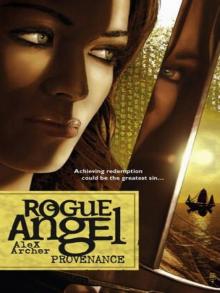 Provenance
Provenance Blood Cursed
Blood Cursed Fury's Goddess
Fury's Goddess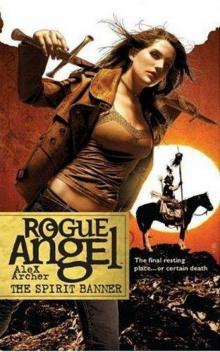 The Spirit Banner
The Spirit Banner Footprints
Footprints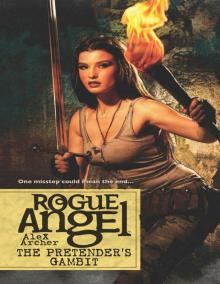 The Pretender's Gambit
The Pretender's Gambit Rogue Angel: The Lost Scrolls
Rogue Angel: The Lost Scrolls Staff of Judea
Staff of Judea Rogue Angel 55: Beneath Still Waters
Rogue Angel 55: Beneath Still Waters The Mortality Principle
The Mortality Principle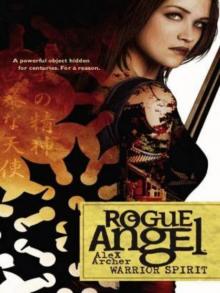 Warrior Spirit
Warrior Spirit Paradox
Paradox Tear of the Gods
Tear of the Gods Forbidden City
Forbidden City River of Nightmares (Rogue Angel)
River of Nightmares (Rogue Angel) Rogue Angel: The Secret of the Slaves
Rogue Angel: The Secret of the Slaves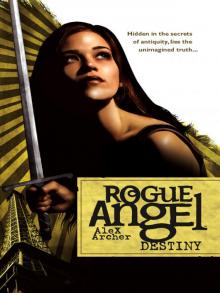 Destiny
Destiny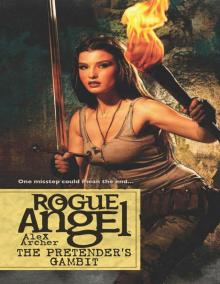 Rogue Angel 51: The Pretender's Gambit
Rogue Angel 51: The Pretender's Gambit Celtic Fire
Celtic Fire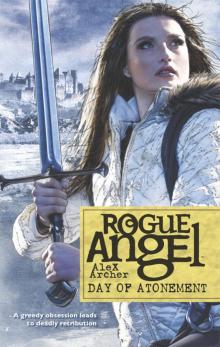 Rogue Angel 54: Day of Atonement
Rogue Angel 54: Day of Atonement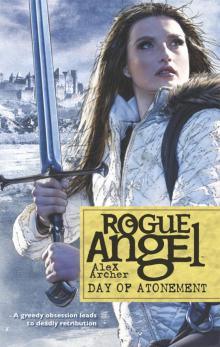 Day of Atonement
Day of Atonement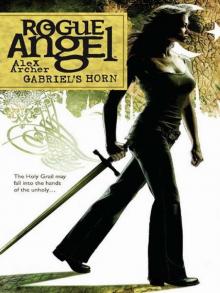 Rogue Angel: Gabriel's Horn
Rogue Angel: Gabriel's Horn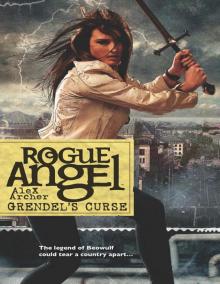 Grendel's Curse
Grendel's Curse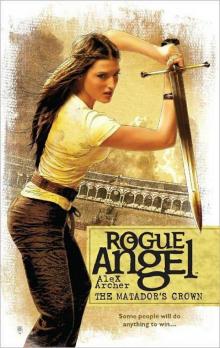 The Matador's Crown
The Matador's Crown Rogue Angel: The Chosen
Rogue Angel: The Chosen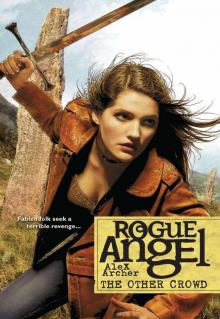 The Other Crowd
The Other Crowd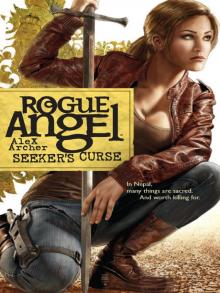 Seeker’s Curse
Seeker’s Curse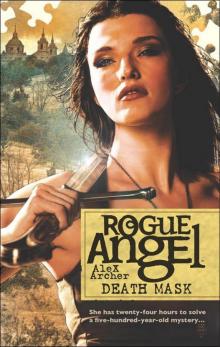 Rogue Angel 52: Death Mask
Rogue Angel 52: Death Mask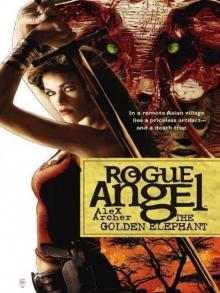 The Golden Elephant
The Golden Elephant Blood Cursed (Rogue Angel)
Blood Cursed (Rogue Angel) Celtic Fire (Rogue Angel)
Celtic Fire (Rogue Angel)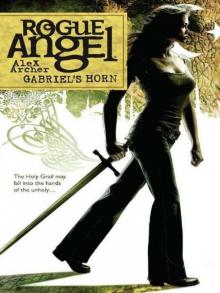 Gabriel's Horn
Gabriel's Horn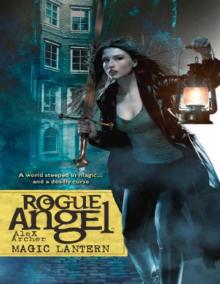 Magic Lantern (Rogue Angel)
Magic Lantern (Rogue Angel) God of Thunder
God of Thunder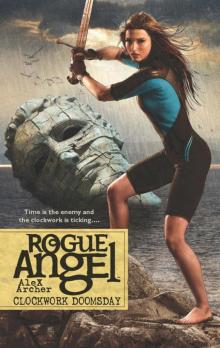 Clockwork Doomsday
Clockwork Doomsday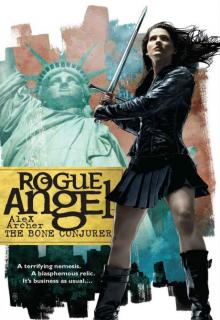 The Bone Conjurer
The Bone Conjurer Treasure of Lima
Treasure of Lima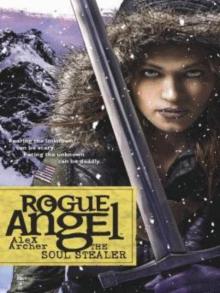 The Soul Stealer
The Soul Stealer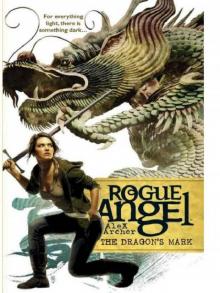 The Dragon’s Mark
The Dragon’s Mark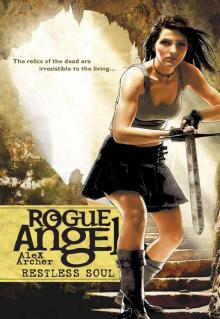 Restless Soul
Restless Soul Rogue Angel: God Of Thunder
Rogue Angel: God Of Thunder Rogue Angel 49: The Devil's Chord
Rogue Angel 49: The Devil's Chord Death Mask
Death Mask Rogue Angel 46: Treasure of Lima
Rogue Angel 46: Treasure of Lima Swordsman's Legacy
Swordsman's Legacy The Oracle's Message
The Oracle's Message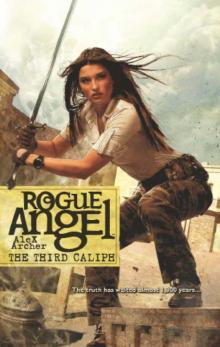 The Third Caliph
The Third Caliph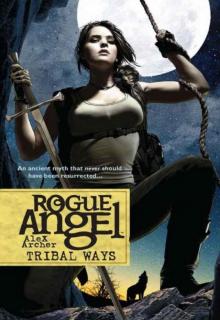 Tribal Ways
Tribal Ways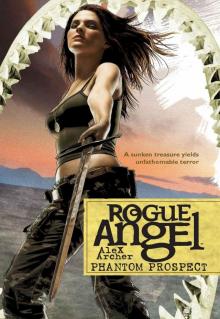 Phantom Prospect
Phantom Prospect Rogue Angel 50: Celtic Fire
Rogue Angel 50: Celtic Fire Library of Gold
Library of Gold Rogue Angel 53: Bathed in Blood
Rogue Angel 53: Bathed in Blood Sacred Ground
Sacred Ground The Devil's Chord
The Devil's Chord Serpent's Kiss
Serpent's Kiss The Vanishing Tribe
The Vanishing Tribe Sunken Pyramid
Sunken Pyramid Sunken Pyramid (Rogue Angel)
Sunken Pyramid (Rogue Angel)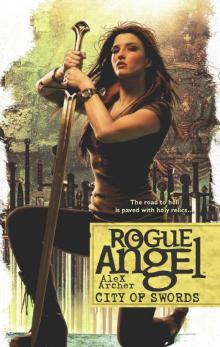 City of Swords
City of Swords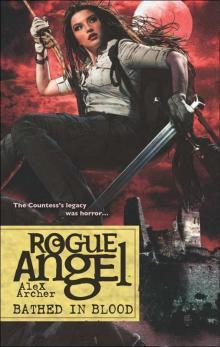 Bathed in Blood
Bathed in Blood The Lost Scrolls
The Lost Scrolls The Babel Codex
The Babel Codex Mystic Warrior
Mystic Warrior Eternal Journey
Eternal Journey Beneath Still Waters
Beneath Still Waters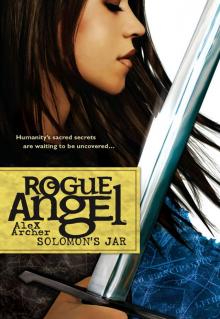 Solomon's Jar
Solomon's Jar Beneath Still Waters (Rogue Angel Book 55)
Beneath Still Waters (Rogue Angel Book 55) Cradle of Solitude
Cradle of Solitude Secret of the Slaves
Secret of the Slaves River of Nightmares
River of Nightmares Polar Quest
Polar Quest False Horizon
False Horizon